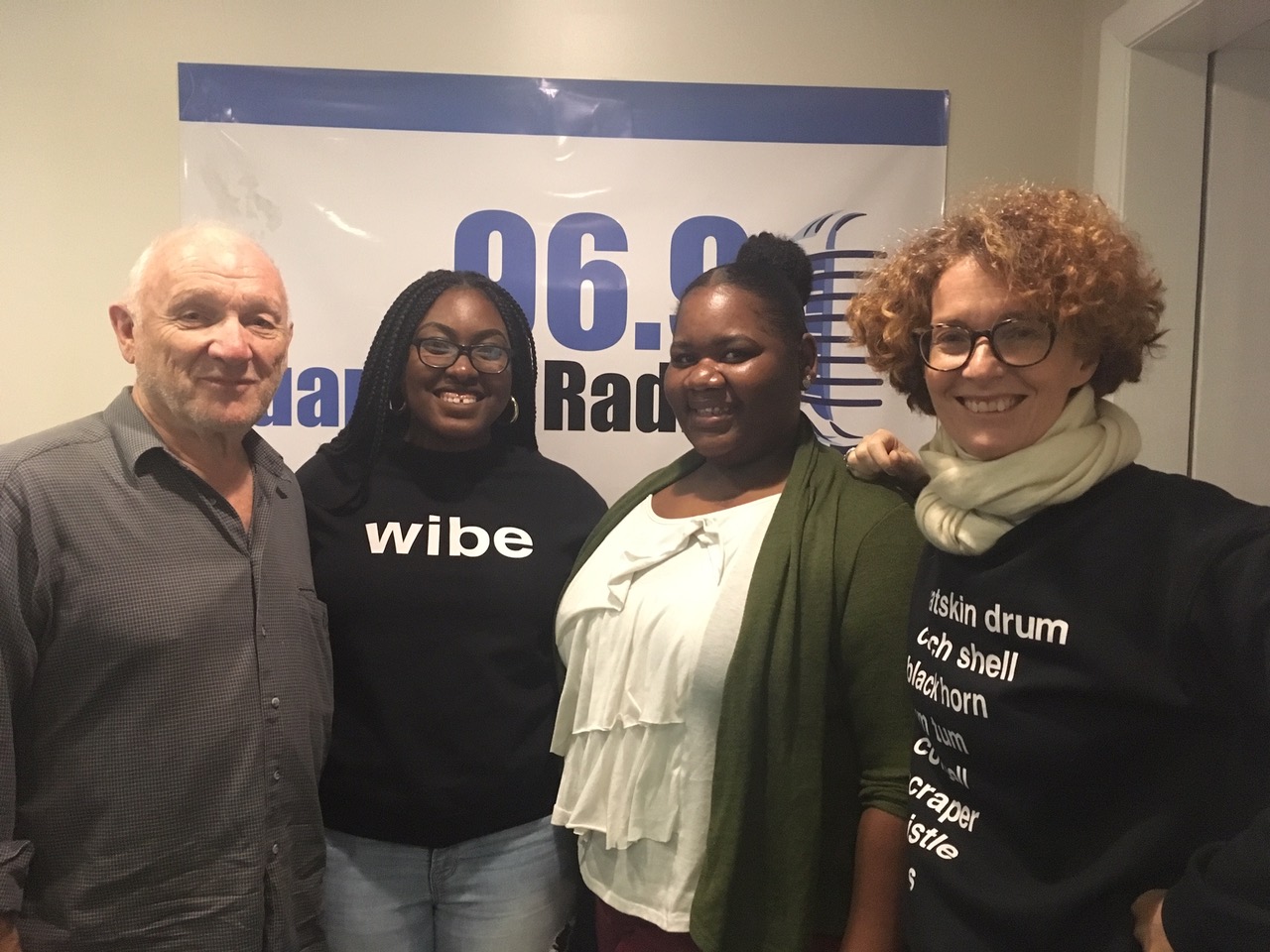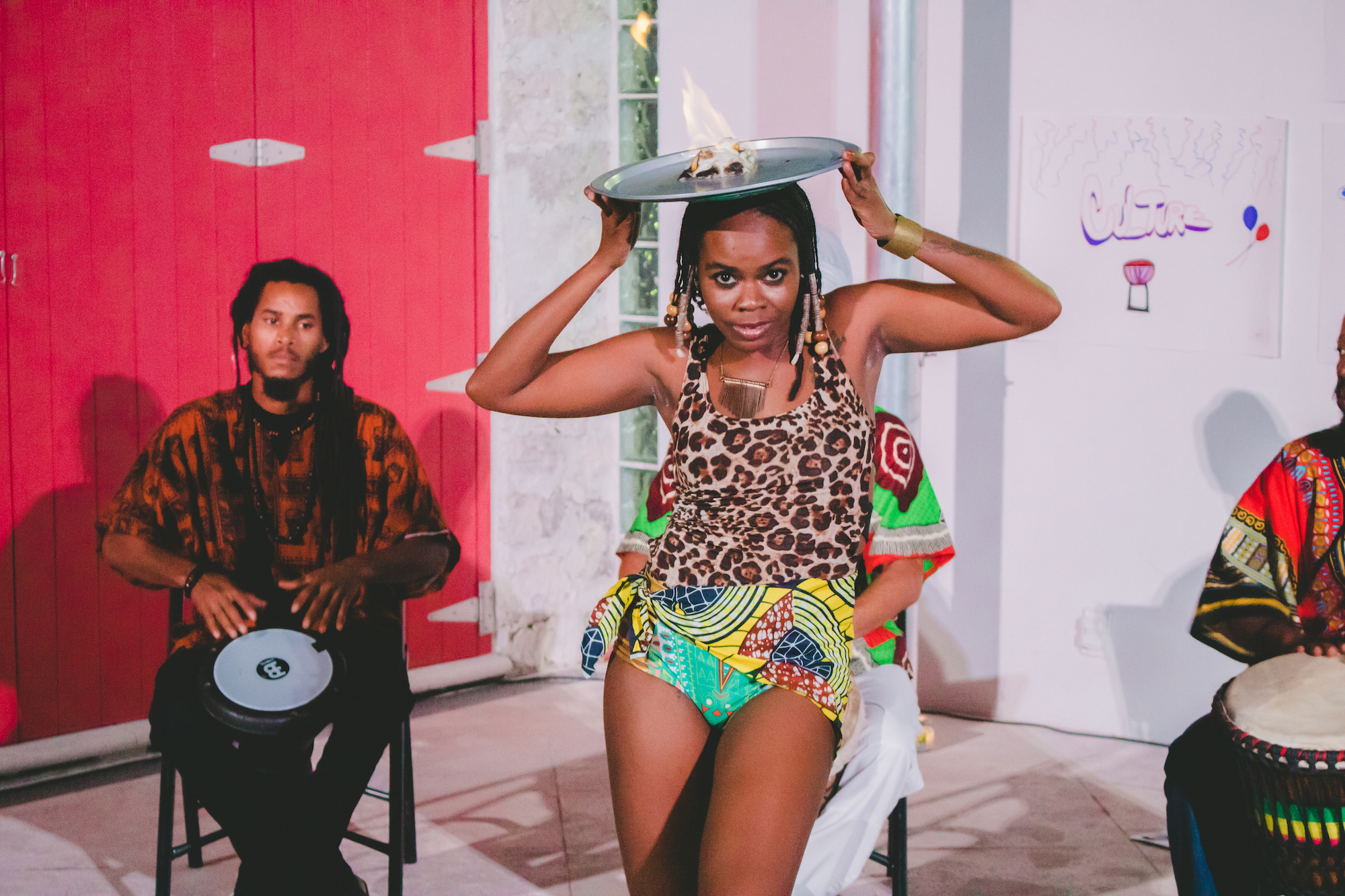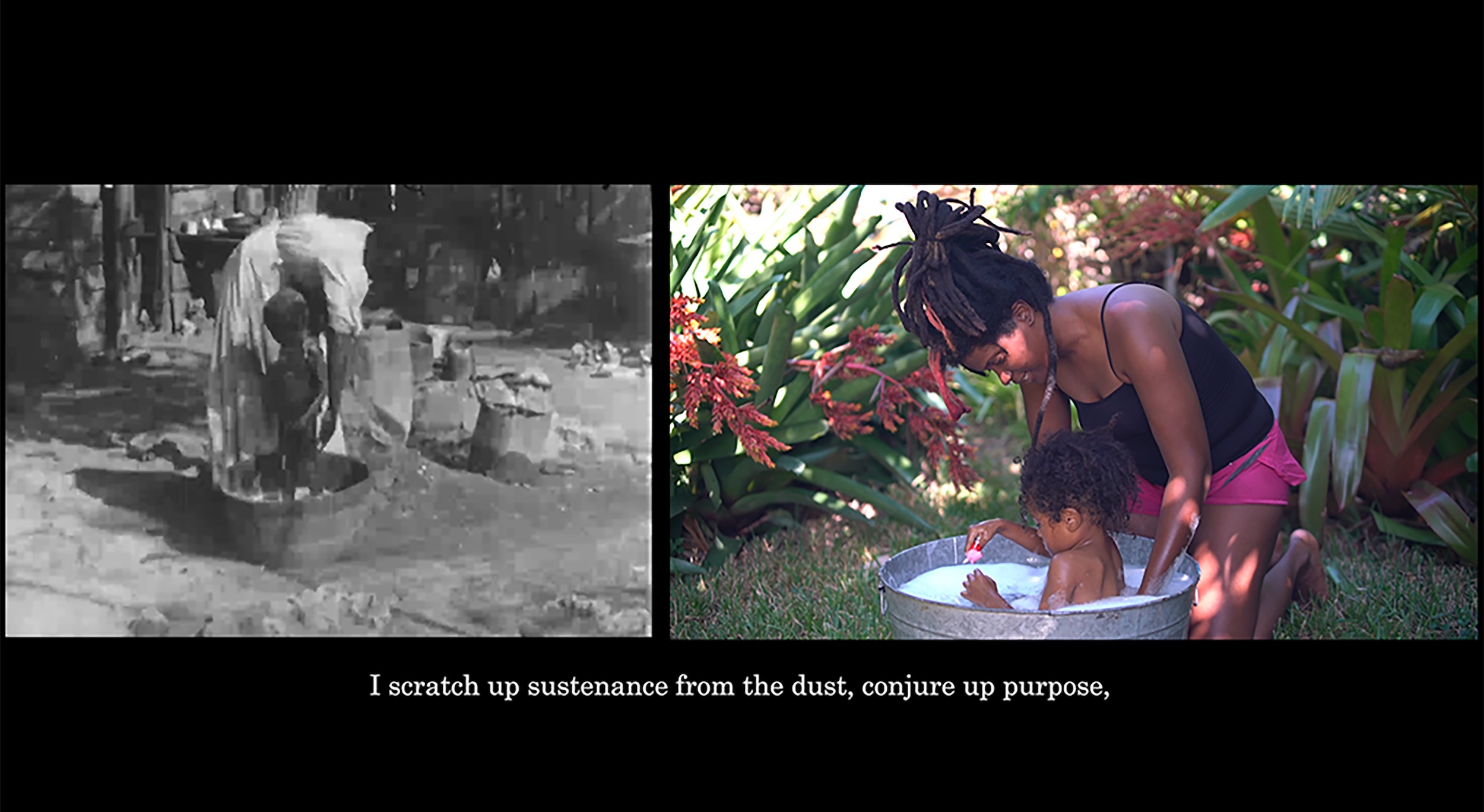The God Self: Lessons on Self-Love from Emerging Artist Cydne Coleby
Kevanté A.C. Cash · 19
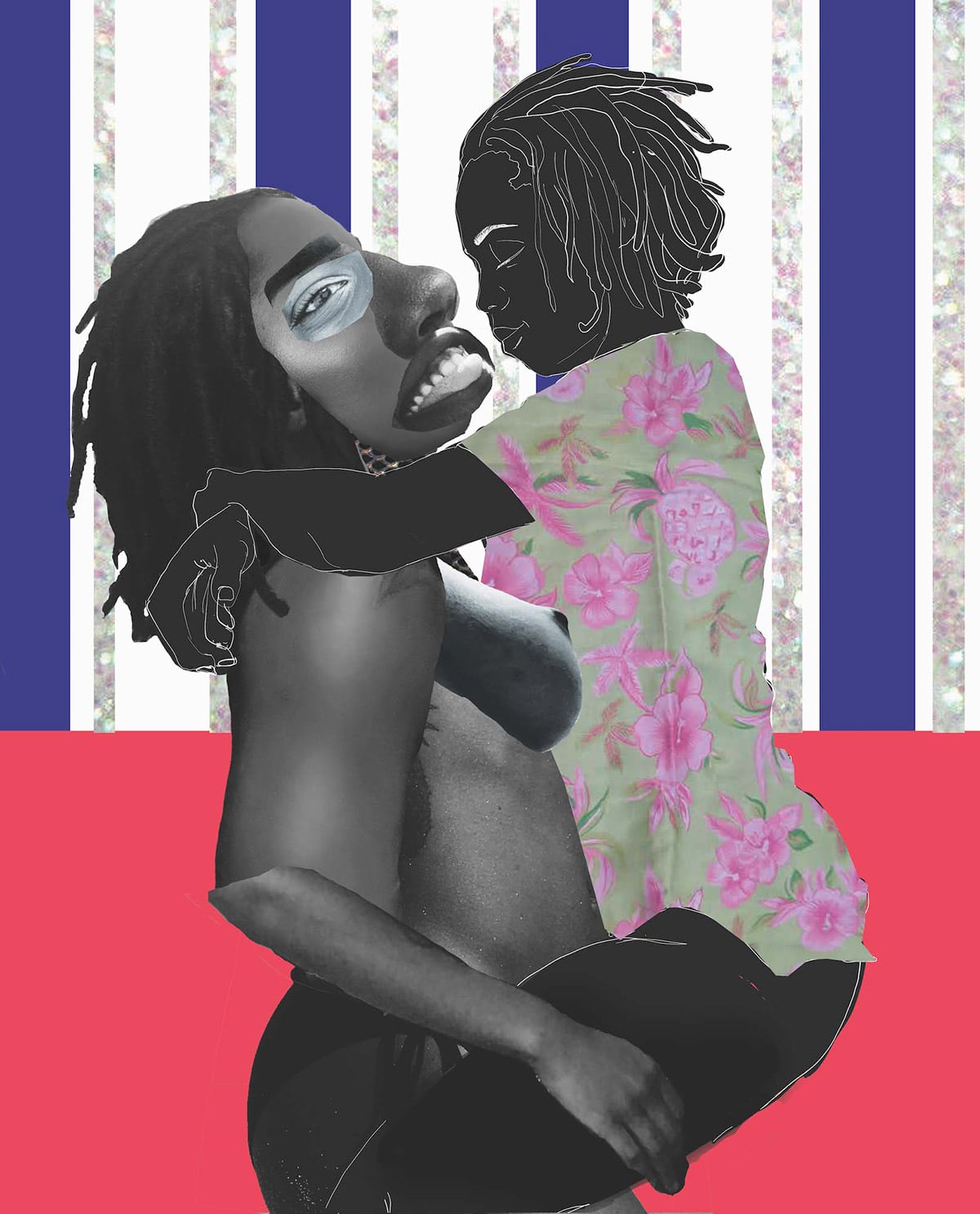
At first glance, through a narrow lens, one could be offended by the works of emerging artist Cydne Coleby supported in the National Exhibition 9 (NE9) The Fruit and The Seed. Crafted with a “slight sense of narcissism”, interwoven with themes of erotic imagery, Coleby addresses the self – the God self, that is. She conducts a session of “soulversations” – moments in time allotted for self to do the work of loving and healing from past traumas and pains through her series A God Called Self.
In her artist statement, she poses the questions: “What if self love is not a selfish thing after all? What happens if I were devoted to the act of loving myself? What happens if I put my needs on the same level as others, or even before others? What happens if I confront the self-deprecating language and replace it with affirmations and kindness? What happens if I made a decision to make my being a place of worship – adorned with patience, understanding, respect, and love?” She poses these questions to herself, but if one were to remove the veil that separates themselves from the artist and her work, they’d come to find the oneness between themselves, the artist, and the work.
These questions inspire points of thought for all to meditate upon. What can really happen if we, as a collective body – the mass of society, were to dedicate ourselves to ourselves? Would the world become a better, more peaceful place to live in if everyone were filled with self-love?

Coleby, a first-time exhibitor within a National Exhibition, says she was in disbelief first learning her proposal for the NE9 had been accepted. It had always been a dream of her’s for as long as she identified as artist, but after making the decision to discontinue her practice for a while, it became a childhood dream like wanting to be an astronaut without making headway to get there. However, she notes, “Being reintroduced to my practice while being accepted into the National Exhibition was just a surreal moment for me because it typically marks a peak in one’s artistic career to be chosen to exhibit among other more prominent artists within the country.”
The Fruit and The Seed’s interpretation can be morphed in so many ways, but for Coleby, the seed planted were acts and thoughts of self-loathing and self-doubt that she cannot specifically identify where it all began, but recognized that she had been reaping negative or ‘sour’ fruits because of it.
“I had been at really low points and for a while, chose to deal with them negatively, violently. Displaying violence towards myself and others. But thankfully, on the other hand, I always had people in my life who were planting seeds of love and appreciation around me. I just finally decided it was time to see what would happen if I watered those seeds myself,” Coleby explains. “I was heavily encouraged by my colleagues at work to submit something and I am super grateful I did. I created works that spoke to their love, admiration, and longing for me, but from the perspective of myself. So, I chose to put myself in positions that are typically seen within loving couples but replaced them with two versions of myself. My soil was filled with some sour and sweet seeds, and as a result I think I’m finally bearing some balanced and enjoyable fruit. Like a nice Granny Smith apple, so to speak.”
The nuances and complexities in one’s attempt to digest the works submitted under A God Called Self can probably be seen first and foremost in the titles themselves, perhaps labeled a blasphemous gesture. Then to add images to text, we find a woman performing the act of cunnilingus on herself in A God Called Self: God First and a woman hoisting another woman (herself) up in A God Called Self: Bae Eternal. A violation of “the natural order of things”, some with religious backgrounds may exclaim, but I’d argue it makes for a useful conversation on the power of perspective and challenging one’s ideals on what is considered ‘good’ or ‘evil’, pure or impure love, and accepted and rejected norms.
Her creative process for this series were a means for her to deal with both the internal and external parts of herself. She explains, “My natural response to emotional stress is to work; so it was nice to have work that forced me to deal with my emotions in a direct yet indirect way. Internally, I created works about an emotional issue, but externally, I was just painting, meeting a deadline, and being good on my agreement with the NAGB.”
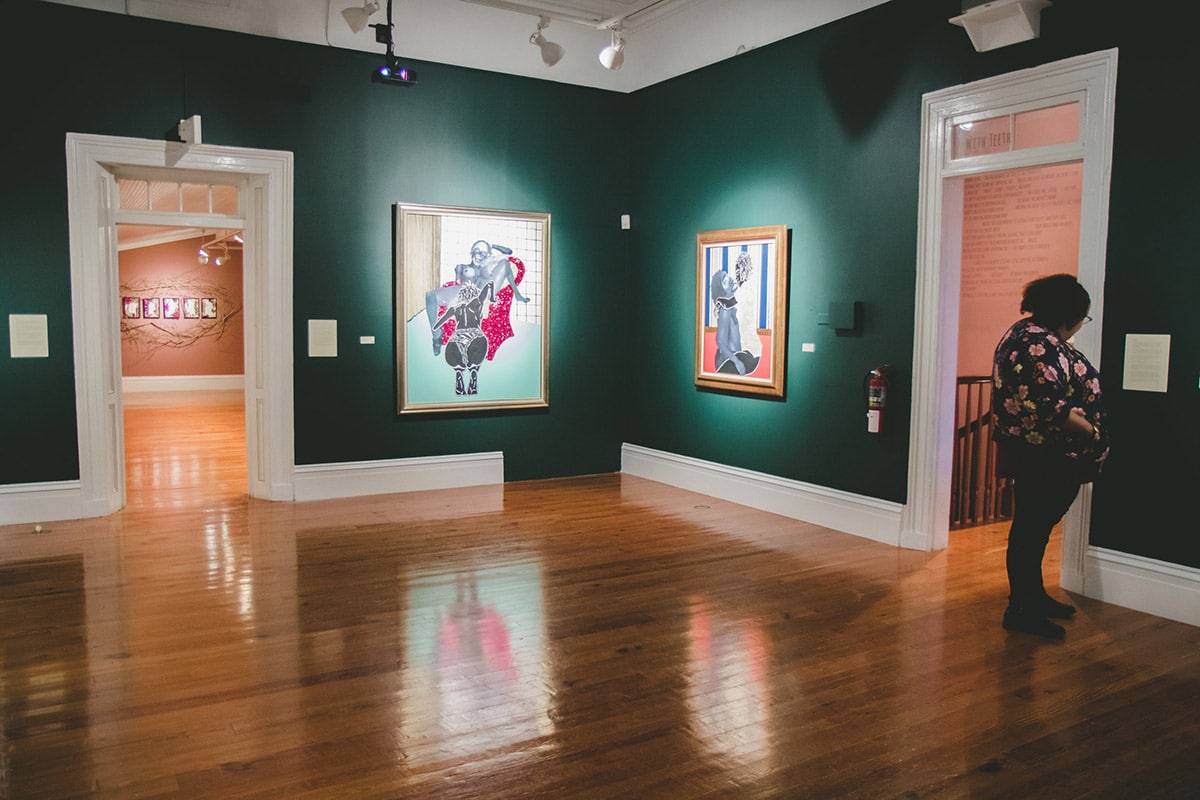
“I found myself listening to a lot of music that put me in the right frame of mind to create. I listened to music about love in term of relationships, rap songs about being boastful and ‘gassing yourself up’, and other songs that reminded me of the people in my life I lost who would have not only appreciated my work, but would have also been the ones to ‘gas me up’ when my tank was feeling low. A fellow artist, and friend of mine once said: ‘The process of creating art felt a lot like dying’ – which though morbid, is true. Don’t get me wrong though, this was a fun piece to make, back pains from awkward positioning aside. But I felt lighter once it was done.”
Coleby says returning to her practice reminded her to embrace her pain in a non-harmful way. “Taking moments to sit with self, identify the pain and make peace with it, can manifest itself in beautiful ways”, she adds.
Though absorbing this work, ironically, takes an act of selflessness to do (which for some, is difficult to perform), Coleby says she’s received nothing but love and appreciation for her self-portraits, claiming “People had found themselves identifying with work and the biggest, most pleasant surprise was that even men had found themselves identifying with the work. Though the theme of self-love and adoration is universal, the work is inherently feminine, so it was nice to see the message resonate with those not identifying as women.”
A God Called Self presents a powerful, timely message on the acts of self-love and self-care, for after all, it is a notion of political warfare according to African-American civil rights activist, writer, poet, warrior, lesbian, mother Audre Lorde.
The Fruit and the Seed remains on display for all to see until Sunday, April 7, 2019 at the National Art Gallery of The Bahamas.
Kevanté Cash is a cultural worker and storyteller with over 10 years of experience in the media and communications industry. They specialise in confessional and experimental poetics, art writing, screenwriting, experimental filmmaking, radio and podcast production, event curation, and workshop facilitation.
